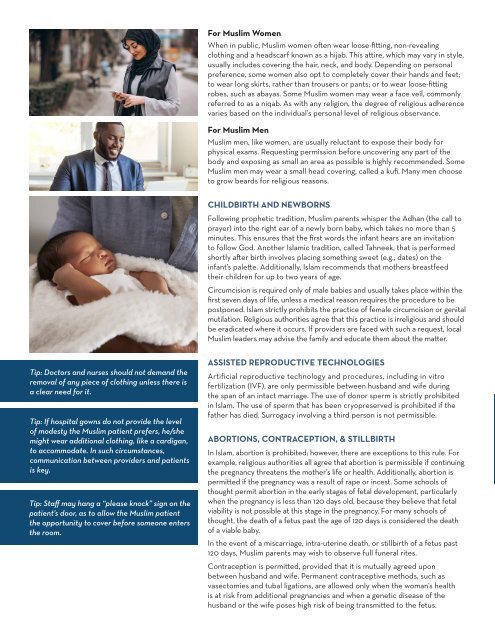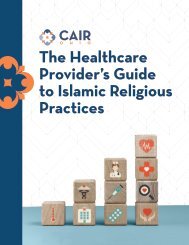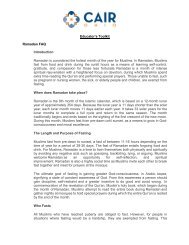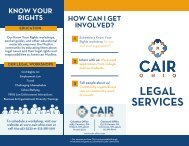CAIR-Ohio-Healthcare-Providers-Guide
You also want an ePaper? Increase the reach of your titles
YUMPU automatically turns print PDFs into web optimized ePapers that Google loves.
For Muslim Women<br />
When in public, Muslim women often wear loose-fitting, non-revealing<br />
clothing and a headscarf known as a hijab. This attire, which may vary in style,<br />
usually includes covering the hair, neck, and body. Depending on personal<br />
preference, some women also opt to completely cover their hands and feet;<br />
to wear long skirts, rather than trousers or pants; or to wear loose-fitting<br />
robes, such as abayas. Some Muslim women may wear a face veil, commonly<br />
referred to as a niqab. As with any religion, the degree of religious adherence<br />
varies based on the individual’s personal level of religious observance.<br />
For Muslim Men<br />
Muslim men, like women, are usually reluctant to expose their body for<br />
physical exams. Requesting permission before uncovering any part of the<br />
body and exposing as small an area as possible is highly recommended. Some<br />
Muslim men may wear a small head covering, called a kufi. Many men choose<br />
to grow beards for religious reasons.<br />
CHILDBIRTH AND NEWBORNS<br />
Following prophetic tradition, Muslim parents whisper the Adhan (the call to<br />
prayer) into the right ear of a newly born baby, which takes no more than 5<br />
minutes. This ensures that the first words the infant hears are an invitation<br />
to follow God. Another Islamic tradition, called Tahneek, that is performed<br />
shortly after birth involves placing something sweet (e.g., dates) on the<br />
infant’s palette. Additionally, Islam recommends that mothers breastfeed<br />
their children for up to two years of age.<br />
Circumcision is required only of male babies and usually takes place within the<br />
first seven days of life, unless a medical reason requires the procedure to be<br />
postponed. Islam strictly prohibits the practice of female circumcision or genital<br />
mutilation. Religious authorities agree that this practice is irreligious and should<br />
be eradicated where it occurs. If providers are faced with such a request, local<br />
Muslim leaders may advise the family and educate them about the matter.<br />
Tip: Doctors and nurses should not demand the<br />
removal of any piece of clothing unless there is<br />
a clear need for it.<br />
Tip: If hospital gowns do not provide the level<br />
of modesty the Muslim patient prefers, he/she<br />
might wear additional clothing, like a cardigan,<br />
to accommodate. In such circumstances,<br />
communication between providers and patients<br />
is key.<br />
Tip: Staff may hang a “please knock” sign on the<br />
patient’s door, as to allow the Muslim patient<br />
the opportunity to cover before someone enters<br />
the room.<br />
ASSISTED REPRODUCTIVE TECHNOLOGIES<br />
Artificial reproductive technology and procedures, including in vitro<br />
fertilization (IVF), are only permissible between husband and wife during<br />
the span of an intact marriage. The use of donor sperm is strictly prohibited<br />
in Islam. The use of sperm that has been cryopreserved is prohibited if the<br />
father has died. Surrogacy involving a third person is not permissible.<br />
ABORTIONS, CONTRACEPTION, & STILLBIRTH<br />
In Islam, abortion is prohibited; however, there are exceptions to this rule. For<br />
example, religious authorities all agree that abortion is permissible if continuing<br />
the pregnancy threatens the mother’s life or health. Additionally, abortion is<br />
permitted if the pregnancy was a result of rape or incest. Some schools of<br />
thought permit abortion in the early stages of fetal development, particularly<br />
when the pregnancy is less than 120 days old, because they believe that fetal<br />
viability is not possible at this stage in the pregnancy. For many schools of<br />
thought, the death of a fetus past the age of 120 days is considered the death<br />
of a viable baby.<br />
In the event of a miscarriage, intra-uterine death, or stillbirth of a fetus past<br />
120 days, Muslim parents may wish to observe full funeral rites.<br />
Contraception is permitted, provided that it is mutually agreed upon<br />
between husband and wife. Permanent contraceptive methods, such as<br />
vasectomies and tubal ligations, are allowed only when the woman’s health<br />
is at risk from additional pregnancies and when a genetic disease of the<br />
husband or the wife poses high risk of being transmitted to the fetus.
















